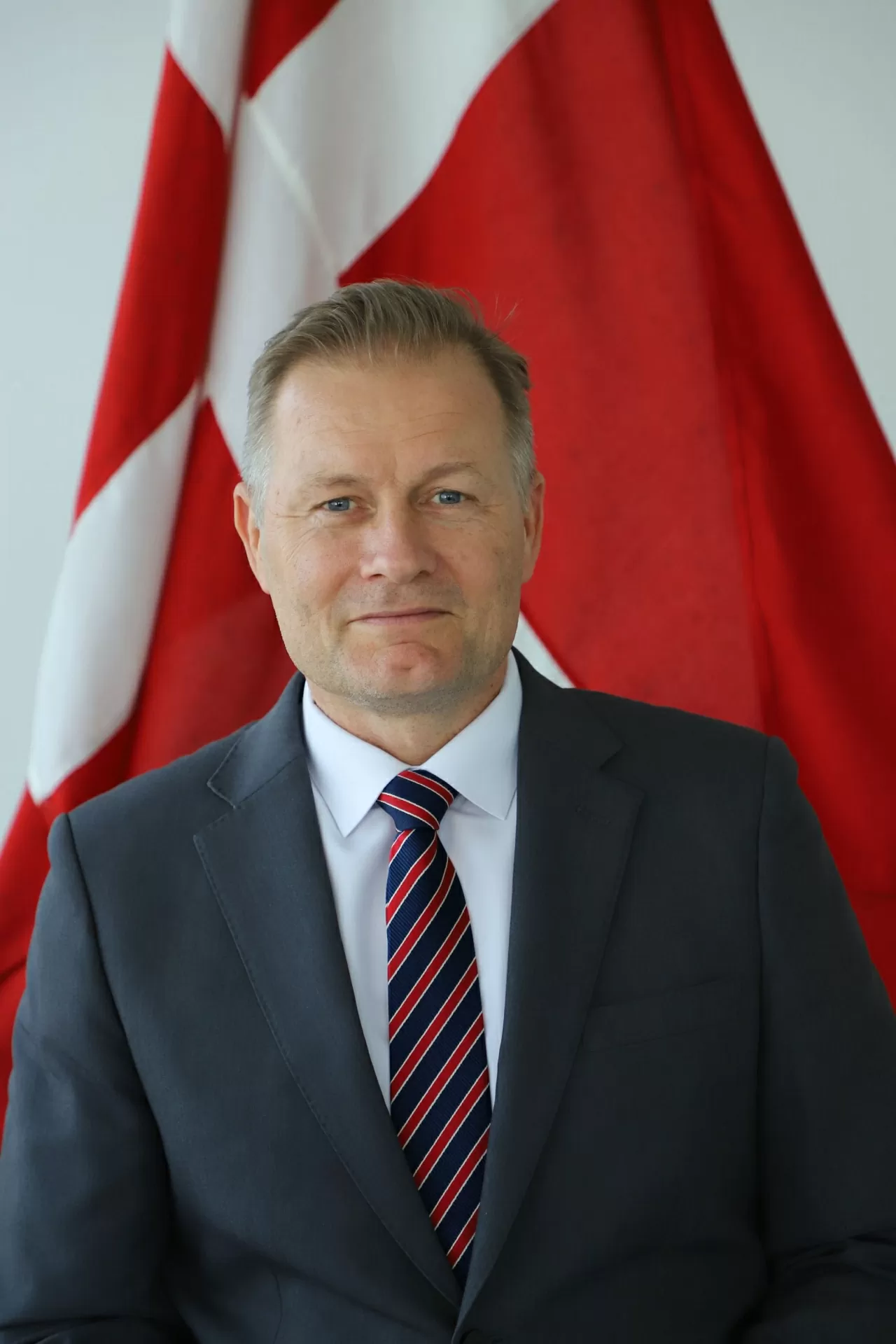 |
| Danish Ambassador to Vietnam Nicolai Prytz said that sustainable development depends on promoting innovation through collective action. (Source: Embassy of Denmark in Vietnam) |
Danish Ambassador to Vietnam Nicolai Prytz gave an interview to The World and Vietnam Newspaper ahead of the 4th Summit of the Partnership for Green Growth and the Global Goals (P4G) 2025 on the progress towards a green economy.
Dear Ambassador, the P4G 2025 Summit with the theme "Green and sustainable transformation, with people at the center" is scheduled to take place on April 14-17 in Hanoi. What is your assessment of the significance of this theme, especially in the context of the whole world taking action for global climate?
In my opinion, the theme of this year’s conference is particularly significant, affirming that a successful green transition requires a comprehensive and multi-dimensional approach. It can be said that this theme is in line with the core objective of P4G – putting people at the center of change – and implies that there is a close connection between the green transition and climate change.
From a global perspective, this year’s conference is well-timed, sandwiched between COP29 and COP30. COP30 in Belém, Brazil, in November 2025 will mark the 10th anniversary of the Paris Agreement and is the deadline for countries to submit updated and more ambitious Nationally Determined Contributions, demonstrating their commitment to advancing climate action and climate justice.
| Related News |
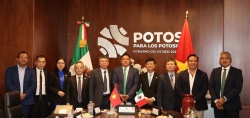 Ambassador Nguyen Van Hai: Vietnamese businesses can learn a lot from Mexico's green transformation Ambassador Nguyen Van Hai: Vietnamese businesses can learn a lot from Mexico's green transformation |
According to the most recent reports of the Intergovernmental Panel on Climate Change (IPCC), if action is not taken now, climate change will have irreversible consequences for the planet and humanity.
At the national level, the effects of climate change are already evident, including in Vietnam. Super Typhoon Yagi and severe flooding in 2024 caused widespread damage. The World Bank considers Vietnam to be one of the most vulnerable countries to climate change. Storms, floods, droughts and landslides regularly threaten people’s livelihoods, especially in rural areas. Vietnam is also facing other environmental issues, such as Hanoi being ranked as one of the most polluted cities in the world by 2025.
Therefore, to effectively respond to global challenges, we cannot continue on the same old path. Sustainable development, in my opinion, depends on promoting innovation through collective action. Governments need to establish guiding and long-term policy frameworks; businesses need to invest in green solutions, in which young people and the start-up community need to become the driving force to come up with breakthrough ideas.
In particular, public-private partnerships are critical to climate action. We need to combine the resources, innovation and scale of the private sector with the policy and financial support of the public sector to tackle complex challenges more effectively.
In addition, to develop truly effective climate solutions, a holistic, people-centred approach is essential – ensuring that no one is left behind in the green transition. Inclusive climate action is not only a vital response to the challenge of climate change, but also key to reducing social and economic inequalities.
Civil society – especially those communities most affected by climate change – holds invaluable knowledge and perspectives. Empowering them, while recognizing the disparities that exist due to gender, race, or socioeconomic status, is not only a matter of justice, but also opens up enormous opportunities for sustainable and inclusive development.
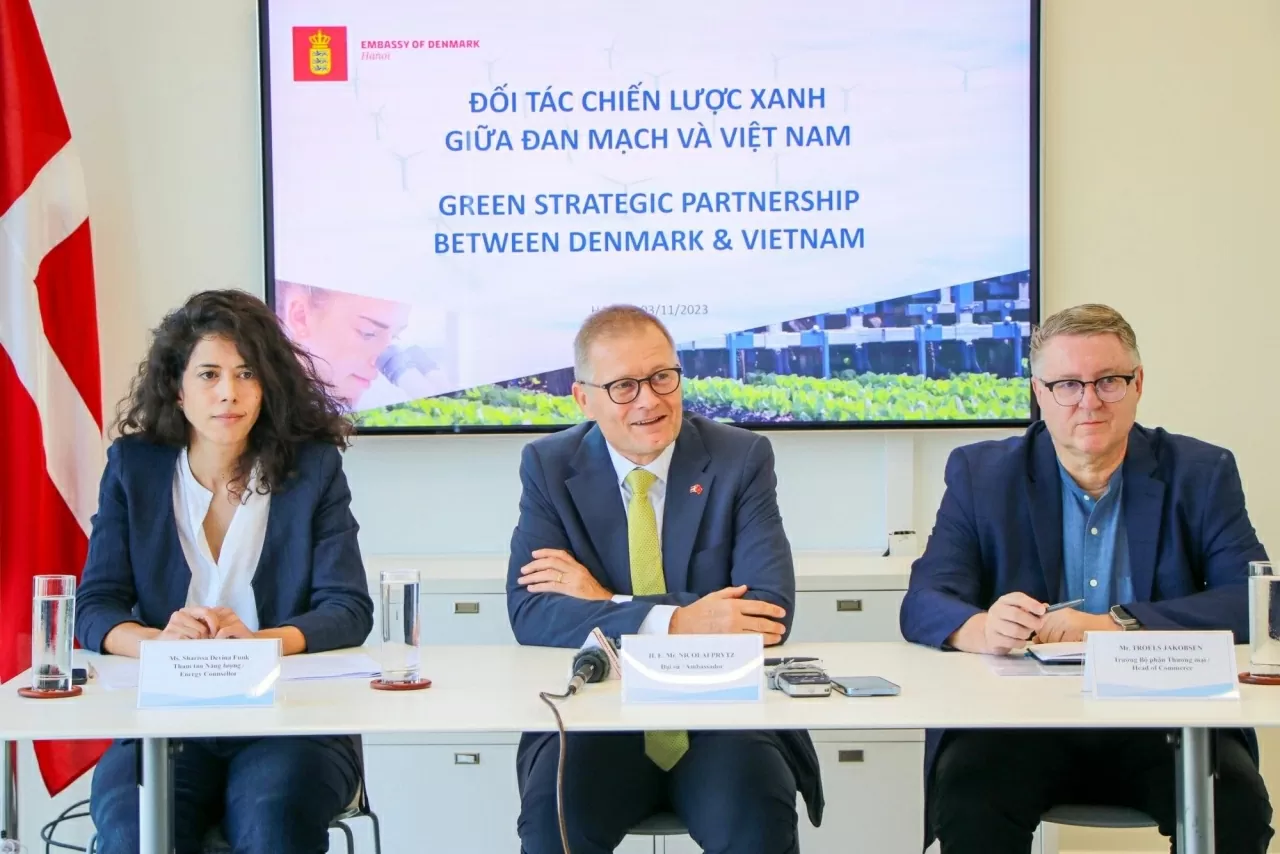 |
| At a press conference in November 2023, Ambassador Nicolai Prytz affirmed that Vietnam and Denmark are both aiming for a common goal of a green future. (Source: Thanh Nien Newspaper) |
Under the principle of “Common But Differentiated Responsibilities”, all countries have a responsibility to respond to climate change, but the level of commitment and obligations varies, reflecting the uneven contribution to the global climate crisis. In addition, one of the important pillars to promote action is climate finance - as at COP29, developed countries committed to mobilize at least USD 300 billion per year for climate change mitigation and adaptation activities.
However, strong commitment and action from countries with high historical emissions are necessary, but not sufficient. Making the green transition a reality requires efforts from all countries, including developing economies, to join hands with concrete actions and responsibilities appropriate to their capacities and circumstances.
For its part, Vietnam was previously a relatively low-emission country, accounting for only about 0.8% of the global total. However, rapid economic growth over the past few decades has made the S-shaped country one of the highest greenhouse gas emitters in Southeast Asia, in terms of emissions per unit of output. Therefore, Vietnam’s leadership, demonstrated by its initiative to host the P4G Summit, is not only meaningful in promoting global efforts to respond to climate change, but also demonstrates a strong determination to realize ambitious national commitments - especially the goal of achieving net zero emissions by 2050.
It is known that Denmark is a pioneer in the field of renewable energy and green technology. Coming to this year's P4G Summit, what will the beautiful Nordic country contribute to the effort to promote the global green transition, Ambassador?
Denmark has long been a leader in the green transition, particularly in areas such as renewable energy, energy distribution and integration, and energy efficiency.
Energy cooperation has also been an important part of the bilateral relationship between Vietnam and Denmark since 2013, through the Joint Energy Partnership Programme. With the aim of supporting Vietnam’s transition to a low-emission economy, we have been sharing our knowledge, capabilities and experience from our own energy transition.
In addition, Denmark, together with the G7, the European Union (EU) and Norway, is a member of the Just Energy Transition Partnership (JETP) between Vietnam and the International Partnership Group (IPG). This initiative initially commits to mobilising a total of USD 15.5 billion in public and private finance to support the decarbonisation of Vietnam’s energy system. As part of Denmark’s contribution as a member of the IPG, we are also promoting government-to-government cooperation in the education sector, with a focus on vocational training for the green transition. These efforts are fully aligned with Vietnam’s national goal of achieving net zero emissions by 2050, ensuring a just, efficient and environmentally sustainable transition.
In addition, as a co-founder and sponsor of P4G, Denmark is particularly interested in helping to shape global green transition efforts. Denmark encourages cooperation between countries and sectors around the world, as we believe that strong partnerships are key to tackling climate change, ensuring energy security and advancing many other important agendas.
Denmark hosted the first P4G Summit in Copenhagen in 2018, which helped raise the profile and awareness of P4G’s partnership-based approach. Since then, we have supported 14 P4G partners by connecting them with relevant stakeholders in Denmark. In my opinion, these partnerships are aligned with Denmark’s development cooperation priorities, including reducing inequality, eradicating poverty and combating climate change. Above all, our contribution through P4G fits into a broader strategy for the green transition and climate commitment, which enables Denmark to maintain its leading role in the global green transition.
In particular, Denmark has an ambitious green agenda, closely linked to its climate goals. In 2020, we enacted the Climate Act, which puts the government on legal responsibility to deliver on its commitments under the Paris Agreement. Specifically, Denmark is committed to reducing greenhouse gas emissions by at least 70% compared to 1990 levels by 2030, achieving climate neutrality by 2045 and moving towards a 110% reduction by 2050. According to the latest assessment by the Danish Climate Council, the country’s climate policy is on track to meet its 2025 commitments.
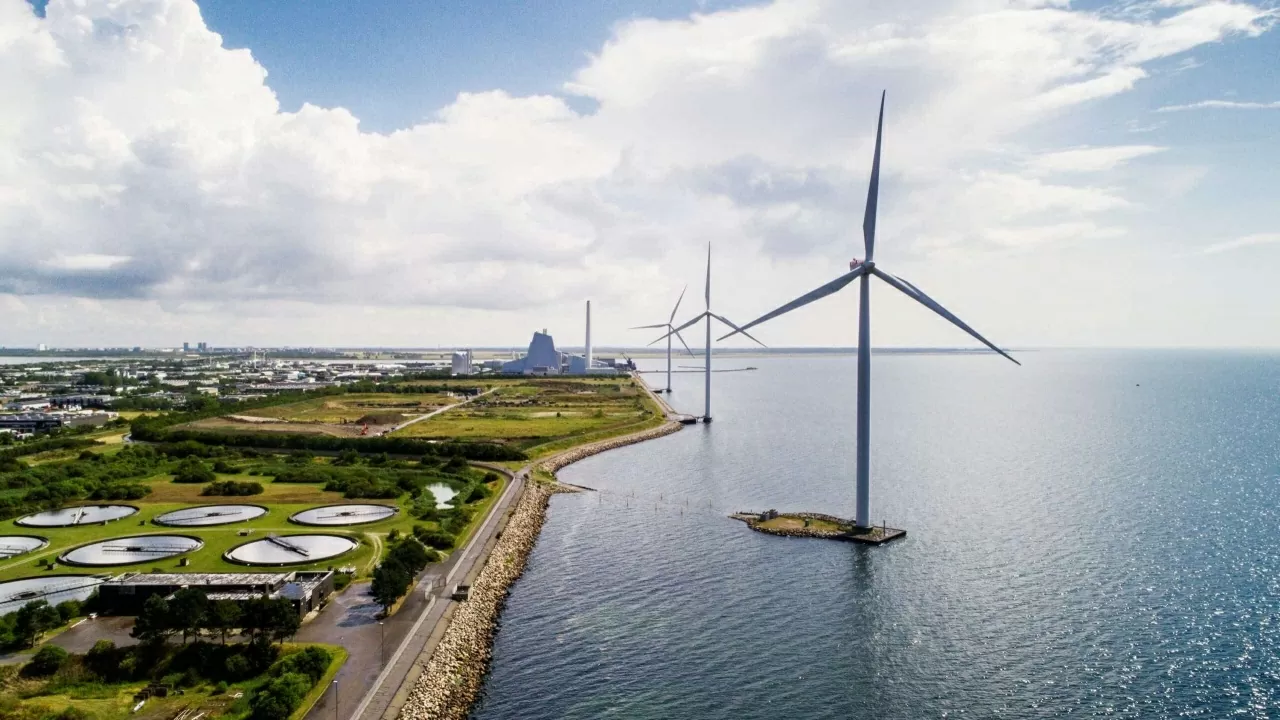 |
| Denmark has long been a leader in the green transition, particularly in areas such as renewable energy, energy distribution and integration, and energy efficiency. (Source: State of Green) |
The Climate Act also states that Denmark has an obligation to contribute to inspiring and promoting global efforts to create real impact.
Denmark is therefore firmly committed to stronger climate commitments from major emitters, while strengthening the resilience of vulnerable countries and promoting science-based action. Within this framework, Denmark hosts the Copenhagen Climate Ministerial Conference in preparation for the annual COP and global negotiations such as the Global Stocktake.
In addition, we are at the forefront of a range of practical initiatives to accelerate the green transition, including: Accelerating the expansion of renewable energy; phasing out fossil fuels through alliances such as the Beyond Oil and Gas Alliance; promoting sustainable practices in the maritime and aviation sectors; supporting small island developing states; and leading the EU’s climate and green transition strategies. These efforts will be further strengthened by Denmark during its rotating EU Presidency in the second half of 2025.
Denmark is committed to redirecting global finance away from fossil fuels and towards green investment. We have reformed the Investment Fund for Developing Countries, significantly increasing its charter capital to promote climate finance.
At least 30% of Denmark’s official development assistance (ODA) is now directed towards climate initiatives, and we are actively mobilising private investment. In addition, Denmark is participating in negotiations on a new post-2025 climate finance target and supports the reform of the Multilateral Development Banks to help developing countries mobilise finance for the green transition. Above all, through international alliances, we are promoting carbon pricing and the phase-out of fossil fuel subsidies, thereby increasing global climate finance for the most vulnerable countries.
At this year’s P4G Summit, one of the key topics is to introduce innovative initiatives and develop action strategies to attract investment for climate startups, especially in emerging markets and developing economies. Could you please tell us why innovation and climate startups play a particularly important role in realizing our climate goals ?
It is increasingly clear that climate innovation and entrepreneurship are key to a successful green transition. Because overcoming the obstacles to achieving our climate goals requires integrated, cross-sectoral solutions. Borderless problems like climate change require new, innovative solutions – and entrepreneurs are essential to bringing their full potential to the table.
Micro, small and medium-sized enterprises (SMEs) are particularly well placed to address these challenges, as they are often more agile and able to respond quickly to changes, opportunities and challenges, which is something that larger businesses sometimes find difficult to do. In Vietnam, SMEs account for 98% of all businesses and play a key role in driving green growth and achieving the country’s ambitious climate goals. Similarly, in Denmark, SMEs, which account for 98.7% of all businesses, have been a strong driver of the green agenda.
Therefore, in phase 2 of P4G (2023-2027), focusing on promoting partnerships with startups is extremely necessary.
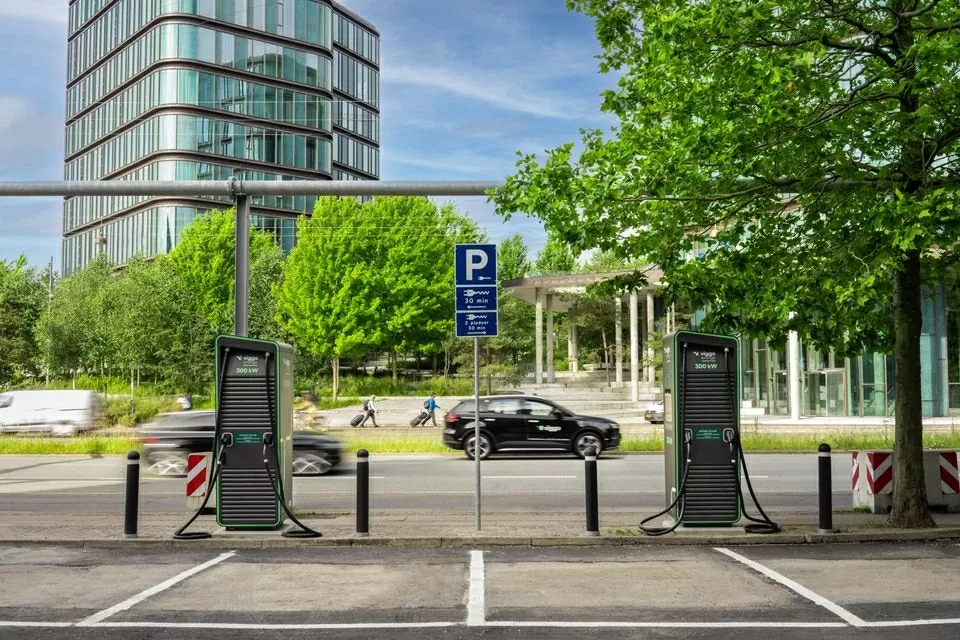 |
| In 2022, transportation technology startup Viggo will launch its first super-fast charging stations in central Copenhagen, marking a special milestone in the Danish capital's green journey. (Source: Via Ritzau) |
In addition, climate startups play a crucial role in providing relevant solutions that accelerate the green transition. Technological innovations, new investment models, and emerging markets are shaping the future, where sustainable development is no longer an option but a top priority. Responding to this trend, P4G acts as a launch pad for early-stage businesses, helping them to access investment capital through technical support, connecting with the government, and especially facilitating access to capital - a factor that small businesses often lack.
P4G currently provides grants averaging around $350,000 per partnership. To date, it has raised around $100 million in investments for 19 climate businesses. For example, the Green Freight Asia Vietnam project, for which P4G has invested $100,000, aims to implement a model that will significantly reduce carbon emissions and pollutants from Vietnam’s freight transport sector by 2050.
It can be said that in the process of moving towards a green economy, the international community is increasingly aware that trade, environmental protection and sustainable development are inseparable. In this context, P4G plays a key role in promoting green and inclusive growth, and at the same time becomes a source of inspiration for many similar initiatives around the world.
As the global economy moves towards a greener, more circular and more innovative economy, I believe that creating opportunities for start-ups is essential. Rapid advances in science, technology and innovation are also creating new pathways to global challenges. Therefore, harnessing the full potential of green start-ups is essential to achieving our ambitious climate goals.
Thank you very much Ambassador!
The Partnership for Green Growth and the Global Goals 2030 (P4G) High-level Forum was established in 2017 on the basis of an initiative of the Danish government, formerly known as the Global Green Growth Forum (3GF). To date, the P4G Forum has 12 member countries including: Denmark, Chile, Mexico, Vietnam, Korea, Ethiopia, Kenya, Colombia, the Netherlands, Bangladesh, Indonesia and South Africa with the participation of more than 90 countries, international organizations and businesses. P4G is considered the world's leading forum for promoting public-private partnerships, connecting governments, businesses and socio-political organizations to jointly develop breakthrough solutions for green growth, contributing to the implementation of the 2030 Sustainable Development Goals (SDGs). P4G's support to partner countries is mainly through public-private partnerships, providing financial and technical support to small and micro enterprises implementing climate change response activities. |
Source: https://baoquocte.vn/dai-su-dan-mach-tai-viet-nam-cac-doanh-nghiep-khoi-nghiep-se-mang-het-tiem-nang-cua-minh-vao-ban-nghi-su-xanh-toan-cau-310793.html


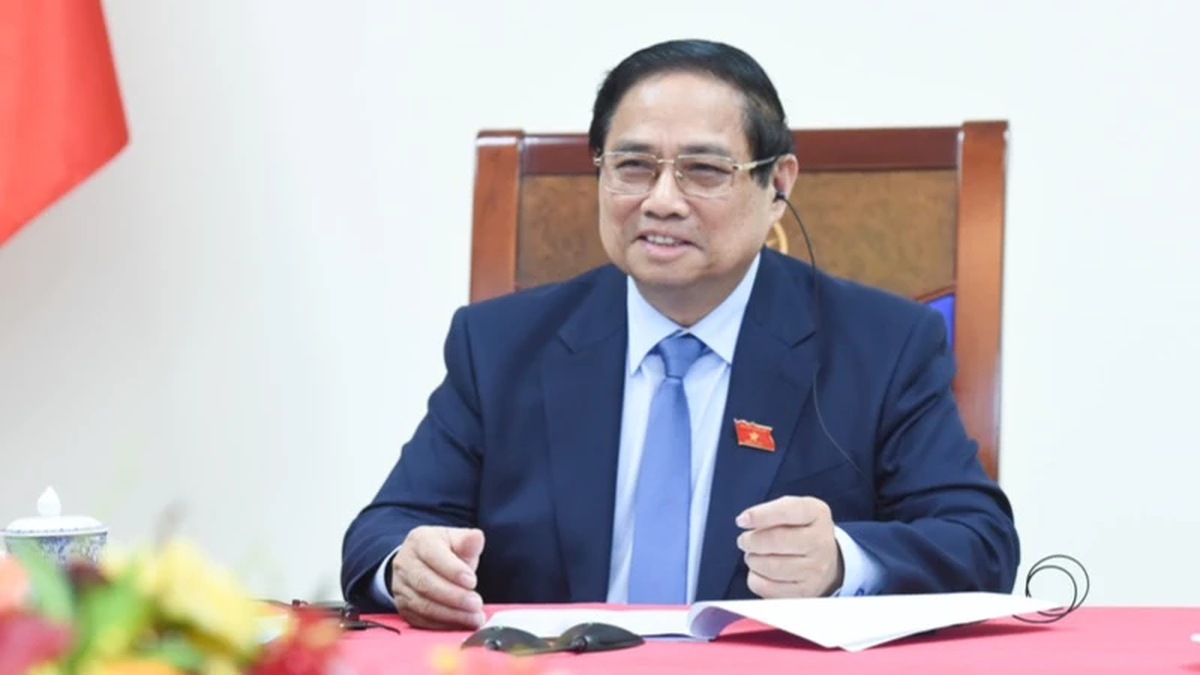
![[Photo] President Luong Cuong presents the decision to appoint Deputy Head of the Office of the President](https://vphoto.vietnam.vn/thumb/1200x675/vietnam/resource/IMAGE/2025/5/8/501f8ee192f3476ab9f7579c57b423ad)

![[Photo] National Assembly Chairman Tran Thanh Man chairs the meeting of the Subcommittee on Documents of the First National Assembly Party Congress](https://vphoto.vietnam.vn/thumb/1200x675/vietnam/resource/IMAGE/2025/5/8/72b19a73d94a4affab411fd8c87f4f8d)
![[Photo] Prime Minister Pham Minh Chinh meets with the Policy Advisory Council on Private Economic Development](https://vphoto.vietnam.vn/thumb/1200x675/vietnam/resource/IMAGE/2025/5/8/387da60b85cc489ab2aed8442fc3b14a)
![[Photo] General Secretary concludes visit to Azerbaijan, departs for visit to Russian Federation](https://vphoto.vietnam.vn/thumb/1200x675/vietnam/resource/IMAGE/2025/5/8/7a135ad280314b66917ad278ce0e26fa)




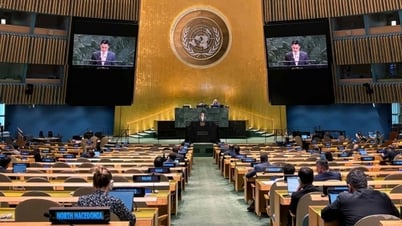







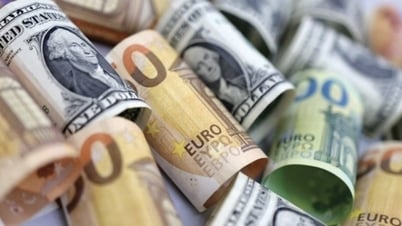
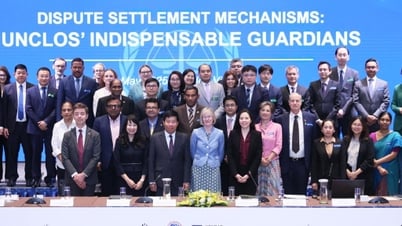


































![[Photo] Prime Minister Pham Minh Chinh talks on the phone with Singaporean Prime Minister Lawrence Wong](https://vphoto.vietnam.vn/thumb/402x226/vietnam/resource/IMAGE/2025/5/8/e2eab082d9bc4fc4a360b28fa0ab94de)















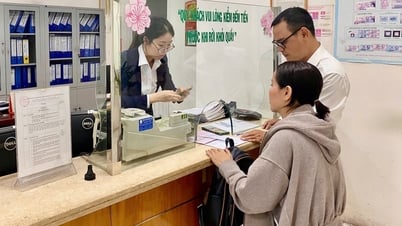



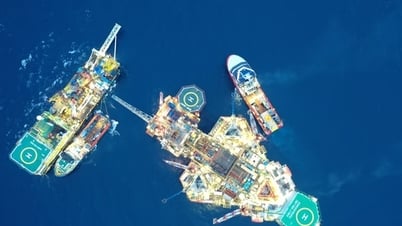













Comment (0)